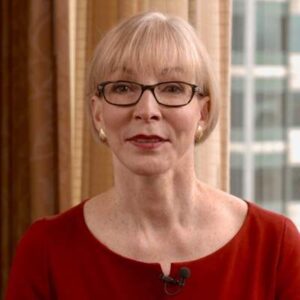Course Leader

Elizabeth (Dr Liz) has over twenty years of experience in providing medical care to the elders. She is board-certified in Internal Medicine, Geriatric Medicine and Palliative Care Medicine. Dr Landsverk founded ElderConsult Geriatric Medicine, a house calls practice, to address the challenging medical and behavioral issues often facing older patients and their families.
Dr Landsverk was an assistant professor of Medicine at University of California, San Francisco, an adjunct professor of Medicine at Stanford University, as well as consultant to the San Francisco Elder Abuse Forensics Center and Hospice Medical Director. She is currently the Medical Director for Silverado and Kensington Dementia Care Communities, as well as on the Scientific Panel for the Alzheimer’s Association. Dr Landsverk graduated from Stanford University, and trained at Cambridge Hospital, Harvard University, and Mt Sinai Medical School.
As a House Calls Geriatrician, she collaborates with local physicians to address the needs of complicated vulnerable elders to alleviate pain, agitation and discomfort through the utilization of geriatric and palliative care techniques.
Learning Objectives
Lesson 1 – What happens to vision as we age?
This lesson provides a brief insight into the course content, and an introduction to the
potential functional effects of poor eyesight on elders.
On completion of this lesson the learner will:
- Understand the general themes of the course content, and why it is
important to maintain the eye health of the elders in their care.
Lesson 2 – What are the Big Four Vision Problems?
This lesson informs learners of the main vision problems in elders.
On completion of this lesson learners will:
- Be able to list the four main vision problems experienced by elders.
Lesson 3 – A word on Macular Degeneration
This lesson examines macular degeneration, its types, clinical features and
common symptoms, alongside the fear that it can prompt in elders with this
diagnosis. Lifestyle causes are discussed, alongside actions to take to reduce
the risk of developing symptoms of macular degeneration.
On completion of this lesson the learner will:
- Understand the risk factors, clinical features and symptoms of
macular degeneration, and lifestyle changes that can minimize the
risk of occurrence.
Lesson 4 – How to Preserve Vision in Dry Macular Degeneration
This lesson summarises the treatments and lifestyle changes that can
minimise the effects of dry macular degeneration.
On completion of this lesson the learner will:
- 1. Understand the impact of lifestyle changes and effective treatments
on patients with macular degeneration.
Lesson 5 – A Word on Glaucoma
This lesson summarises the types, clinical features and treatments for
glaucoma. Acute glaucoma as a medical emergency is discussed. Lifestyle
changes are suggested to reduce risk and symptoms of glaucoma.
On completion of this lesson the learner will:
- Be aware of the signs and symptoms, and action needed for acute
glaucoma as a medical emergency. - Understand the clinical features, symptoms and treatments pf
glaucoma - Understand what lifestyle changes can improve symptomatic load in
patients with glaucoma
Lesson 6 – A Word on Cataracts
This lesson summarises the clinical features and symptoms of cataracts. The
quantitive positive effects of surgery are examined. Lifestyle changes that can
reduce the risk and symptomatic load of cataracts are discussed.
On completion of this lesson the learner will:
- Understand the clinical features, symptoms and effects on quality of
life of cataracts - Understand the clinical benefits of surgery, and the positive effects
of surgery on function and quality of life
Lesson 7 – A Word on Diabetic Retinopathy
This lesson summarises the clinical features, symptoms and treatments for
diabetic retinopathy. Its relationship with type 1 and type 2 diabetes is
examined. Disease staging is also discussed. Lifestyle changes that can be
beneficial to people with diabetic retinopathy are discussed.
On completion of this lesson the learner will:
- Understand the clinical features and symptoms of diabetic
retinopathy. - Understand the basics of disease staging and the disease
relationship with type 1 and 2 diabetes. - Have awareness of how lifestyle changes can reduce risk for and
symptoms of diabetic retinopathy
Lesson 8 – How do you Take Care of Vision
This lesson summarises key preventative steps to care for eye health
including vision tests, recommended supplements and lifestyle changes.
On completion of this lesson the learner will:
- Understand the importance of preventative screening for long term
eye health - Understand how healthy lifestyle and appropriate vitamin
supplements can improve and maintain eye health
Lesson 9 – Is Vision Within the Scope of the Geriatrician?
This lesson discusses the geriatricians’ scope of practice when caring for
elder’s eye health. Recommendations for specialist optometry services are
made for specific eye complaints.
On completion of this lesson the learner will:
- Understand what speciality physician input is required when
maintaining elders’ eye health.
Summary
This course provides the learner with basic knowledge on the main conditions
that cause vision problems. On completion of the course the learner will
understand the basic clinical features of each complaint, know when to seek
urgent medical advice and what facility or speciality physician is appropriate
for different scenarios. The learner will have awareness of what kinds of
treatments are commonly used for each condition. The learner will also
understand the benefits of maintaining good physical health through lifestyle
changes, and the positive effect this has on long-term eye health.
About Instructor


